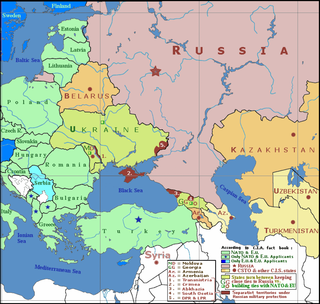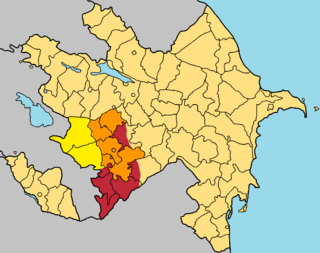
Abdullah Öcalan, also known as Apo, is a founding member of the militant Kurdistan Workers' Party (PKK).

The First Nagorno-Karabakh War was an ethnic and territorial conflict that took place from February 1988 to May 1994, in the enclave of Nagorno-Karabakh in southwestern Azerbaijan, between the majority ethnic Armenians of Nagorno-Karabakh backed by Armenia, and the Republic of Azerbaijan with support from Turkey. As the war progressed, Armenia and Azerbaijan, both former Soviet republics, entangled themselves in protracted, undeclared mountain warfare in the mountainous heights of Karabakh as Azerbaijan attempted to curb the secessionist movement in Nagorno-Karabakh.
The OSCE Minsk Group was created in 1992 by the Conference on Security and Cooperation in Europe (CSCE), now Organization for Security and Co-operation in Europe (OSCE), to encourage a peaceful, negotiated resolution to the conflict between Azerbaijan and Armenia over Nagorno-Karabakh.

In international relations, a frozen conflict is a situation in which active armed conflict has been brought to an end, but no peace treaty or other political framework resolves the conflict to the satisfaction of the combatants. Therefore, legally the conflict can start again at any moment, creating an environment of insecurity and instability.

The Nagorno-Karabakh conflict is an ethnic and territorial conflict between Armenia and Azerbaijan over the region of Nagorno-Karabakh, inhabited mostly by ethnic Armenians until 2023, and seven surrounding districts, inhabited mostly by Azerbaijanis until their expulsion during the 1990s. The Nagorno-Karabakh region was entirely claimed by and partially controlled by the breakaway Republic of Artsakh, but was recognized internationally as part of Azerbaijan. Azerbaijan gradually re-established control over Nagorno-Karabakh region and the seven surrounding districts.

There are no diplomatic relations between Armenia and Azerbaijan. The two neighboring states had formal governmental relations between 1918 and 1921, during their brief independence from the collapsed Russian Empire, as the First Republic of Armenia and the Democratic Republic of Azerbaijan; these relations existed from the period after the Russian Revolution until they were occupied and annexed by the Soviet Union, becoming the constituent republics of Soviet Armenia and Soviet Azerbaijan. Due to the five wars waged by the countries in the past century—one from 1918 to 1921, another from 1988 to 1994, and the most recent in 2016, 2020 and 2023—the two have had strained relations. In the wake of hostilities, social memory of Soviet-era cohabitation is widely repressed through censorship and stigmatization.

The Bishkek Protocol was a provisional ceasefire agreement, signed by the representatives of Armenia, Azerbaijan, the unrecognized Republic of Artsakh, and Russia on May 5, 1994, in Bishkek, the capital of Kyrgyzstan.

The Kurds in Azerbaijan form a part of the historically significant Kurdish population in the post-Soviet space. Kurds established a presence in the Caucasus with the establishment of the Kurdish Shaddadid dynasty in the 10th and 11th centuries. Some Kurdish tribes were recorded in Karabakh by the end of the sixteenth century. However, virtually the entire contemporary Kurdish population in the modern Azerbaijan descends from migrants from 19th-century Qajar Iran.
The Tehran Communiqué, also known as the Joint statement of the heads of state in Tehran is the joint communiqué mediated by Iranian President, Akbar Hashemi Rafsanjani and signed by the acting President of Azerbaijan, Yagub Mammadov and President of Armenia, Levon Ter-Petrossian on May 7, 1992 with an intention to end the four-year-long hostilities between Armenia and Azerbaijan over the Nagorno-Karabakh region, a former autonomous oblast of the Azerbaijan SSR.

The Madrid Principles were proposed peace settlements of the Nagorno-Karabakh conflict, proposed by the OSCE Minsk Group. The OSCE Minsk Group was the only internationally agreed body to mediate the negotiations for the peaceful resolution of the conflict prior to the renewed outbreak of hostilities in 2020. Senior Armenian and Azerbaijani officials had agreed on some of the proposed principles but made little or no progress towards the withdrawal of Armenian forces from occupied territories or towards the modalities of the decision on the future Nagorno-Karabakh status.

The Solution process, also known as Peace process or the PKK–Turkish peace process, was a peace process that aimed to resolve the conflict between the Turkey and PKK as part of the Kurdish–Turkish conflict (1978–present). The conflict has been ongoing since 1984 and resulted in some 40,000 mortal casualties and great economic losses for Turkey as well as high damage to the general population.

The 2016 Nagorno-Karabakh conflict, also known as the Four-Day War, April War, or April clashes, began along the former Nagorno-Karabakh line of contact on 1 April 2016 with the Artsakh Defence Army, backed by the Armenian Armed Forces, on one side and the Azerbaijani Armed Forces on the other.
Kurdish-Turkish peace initiatives, there were several, since the conflict with the Kurdistan Workers' Party began in 1978. Some were successful, others not. But the first real approach to the Kurdish question in Turkey came after the Government of Turgut Özal decided to end the policy of denial of the Kurds and allow the Kurdish language to be spoken in 1991 and later on in the same year also to be broadcast.
The Kurdistan Workers' Party ceasefire of 1993 was a short lived ceasefire declared by Abdullah Öcalan at a press conference. He held together with Jalal Talabani ahead of Newroz on the 17 March 1993.

The Second Nagorno-Karabakh War was an armed conflict in 2020 that took place in the disputed region of Nagorno-Karabakh and the surrounding occupied territories. It was a major escalation of an unresolved conflict over the region, involving Azerbaijan, Armenia and the self-declared Armenian breakaway state of Artsakh. The war lasted for 44 days and resulted in Azerbaijani victory, with the defeat igniting anti-government protests in Armenia. Post-war skirmishes continued in the region, including substantial clashes in 2022.

The 2020 Nagorno-Karabakh ceasefire agreement was an armistice agreement that ended the Second Nagorno-Karabakh War. It was signed on 9 November by the President of Azerbaijan Ilham Aliyev, the Prime Minister of Armenia Nikol Pashinyan and the President of Russia Vladimir Putin, and ended all hostilities in the Nagorno-Karabakh region from 00:00, on 10 November 2020 Moscow time. The president of the self-declared Republic of Artsakh, Arayik Harutyunyan, also agreed to an end of hostilities.
This is the military history of the 2020s.
The following is list of the official reactions to the Second Nagorno-Karabakh War.
Because of the geography, history, and sensitivities of the Nagorno-Karabakh conflict, accusations, allegations, and statements have been made of involvement by third-party and international actors during the Second Nagorno-Karabakh War, including in media reports. Azerbaijan has been accused of employing Syrian mercenaries during the war, including reports by the Syrian Observatory for Human Rights (SOHR). There have also been allegations of Kurdish militia from Syria and Iraq fighting on the Armenian side, and although some third-party sources had confirmed it, some publications had considered these claims "dubious". During the war, ethnic Armenian volunteers from the Middle East, Europe, and Latin America fought on Armenian side. Both sides have denied employing mercenaries in the war, but the OHCHR had stated that there were reports about Syrian fighters motivated primarily by private gain fighting on Azerbaijan's side recruited with Turkey's assistance and foreign nationals fighting on Armenian side with motivation being investigated, calling for withdrawal of any mercenaries and related actors from Nagorno-Karabakh.

The blockade of Nagorno-Karabakh was an event in the Nagorno-Karabakh conflict. The region was disputed between Azerbaijan and the breakaway Republic of Artsakh, internationally recognised as part of Azerbaijan, which had an ethnic Armenian population and was supported by neighbouring Armenia, until the dissolution of Republic of Artsakh on 28 September 2023.